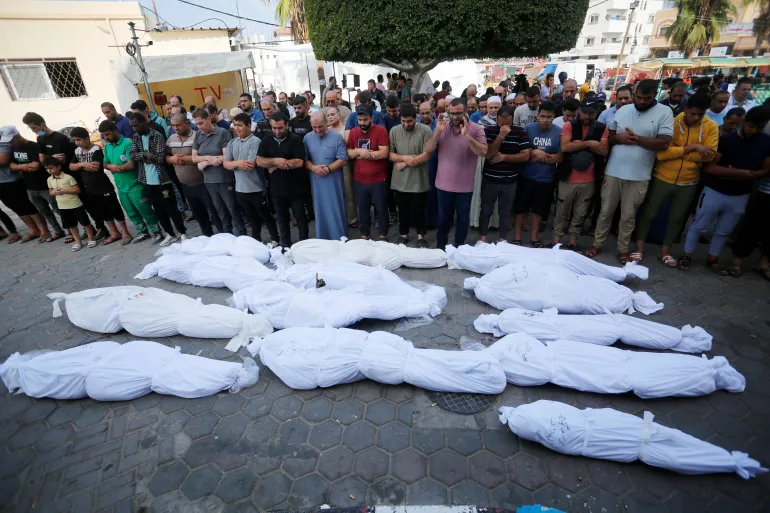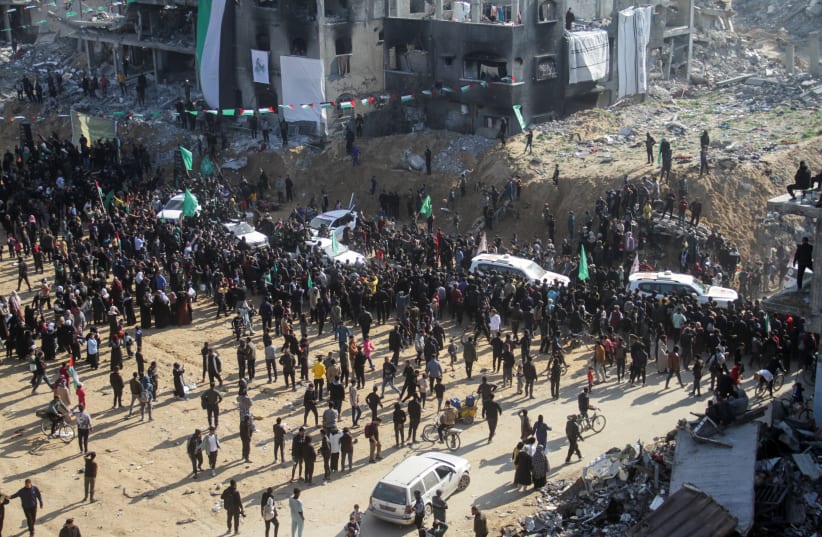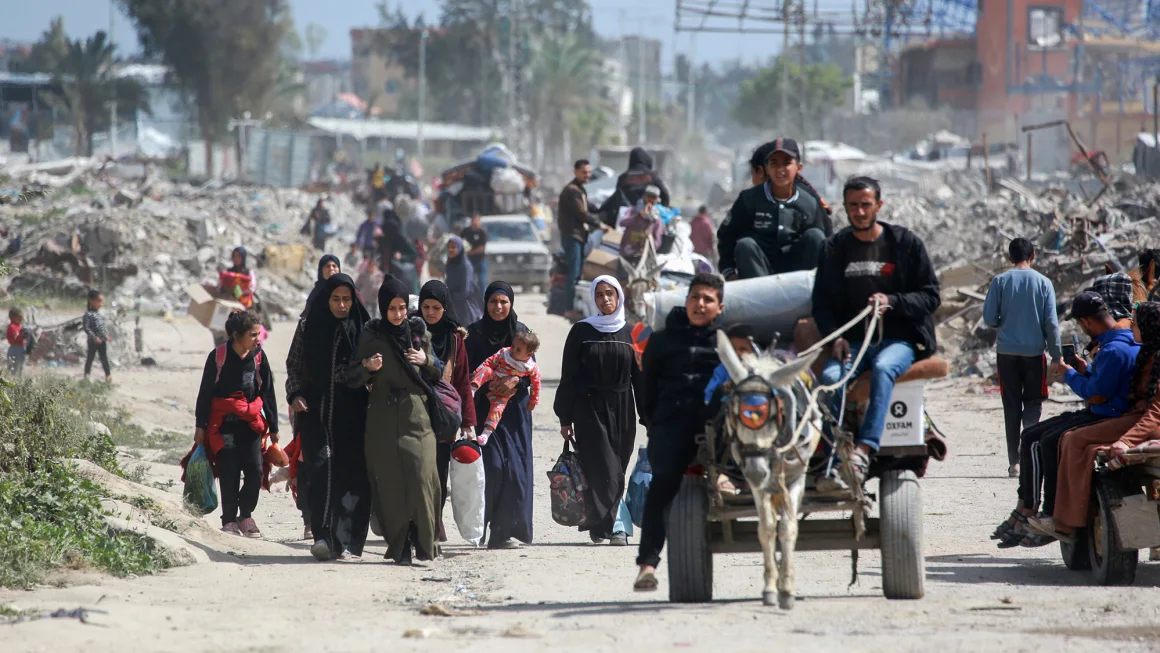Foreign
Mass graves, rushed burials: Funeral rites bypass Gaza dead amid Israel war

Due to sheer number of casualties every day, Palestinians killed by Israel are quickly buried without processions or large congregations.

Deir el-Balah, Gaza Strip – It was late Friday night, and 28-year-old Amani al-Hor had just returned home when the missile struck her parents’ home right next door.

Amani had spent a couple of hours there that evening, playing a card game with her cousin to take their minds off the sound of the aerial bombings. She had chatted to her siblings and then taken her four children, who she said were “being a nuisance”, back to their own house.
There were eight families spanning three generations under her parents’ roof that evening, in the Nuseirat refugee camp. Amani’s parents, their married children, the grandchildren and other relatives who had been displaced from their homes had all gathered to be together.
Shortly after 8pm, an Israeli air attack targeted the house. At least 40 members of Amani’s family were killed, including her parents, nearly all of her siblings and every one of their children.
The attack also damaged Amani’s house.
“I just found the walls and ceiling falling on us,” she said. “I didn’t hear the sound of the missile. It was like being in a grave. Somehow, I grabbed my four children in the dark and we managed to get out.”
Still in a state of shock, she began counting her family members that had been killed.
“My sister and her four children; my brother, his wife and their four daughters; my other sister-in-law, her son and two daughters – but her husband, my other brother survived,” she said. “It was a very crowded building and the children made a lot of noise. Most of them are still under the rubble.”
“I wish I could see my father,” Amani said. “I only saw the back of him that night, he was telling my siblings something as I was leaving. My mother’s body is torn into pieces. At the hospital, I only saw her arms, and her intestines had spilled out of her stomach.”
Amani had been very close to her sisters, talking to them every day.
“I wish I was killed with them,” she said.
No room left in cemeteries
More than 9,000 Palestinians – the majority of them women and children – have been killed by Israeli forces since they began their offensive on the Gaza Strip on October 7. More than 32,000 more have been wounded.

With hospital morgues overflowing, the bodies of Palestinians killed in Israeli attacks undergo rushed funeral rites [Ashraf Amra/Al Jazeera]
Hundreds of Palestinians have been killed every day and night since the bombing began, overwhelming hospitals, which are now in a state of collapse due to the total blockade imposed by Israel. Electricity, clean water and fuel have all run out, and there are no medical supplies or lifesaving treatments. At least 15 hospitals and medical centres have been forced to stop operating, meaning that patients have to be transferred to the remaining hospitals, which are already overcrowded.
The sheer number of casualties over the past 28 days has resulted in expedited funeral rites and burials, with the added anguish of laying family members to rest in mass graves.
“Before the war, funerals had rituals that were followed,” said Mukhtar al-Hor, 57, and a relative of Amani. “Dozens or hundreds of people would pray over the deceased before carrying them to the cemetery to be buried. Now, there are barely a handful of people available to pray over their loved ones.”
The cemetery in Deir el-Balah has run out of room and as a result, mass graves are being dug for necessity [Ashraf Amra/Al Jazeera]
Mukhtar said that at least 18 bodies had so far been pulled out from under the rubble in the Nuseirat refugee camp, but some of them were body parts that could not be identified.
“I cannot describe what it is like to bury your family in a mass grave,” he said. “They are devoid of the funeral rites that we were used to during ordinary times.”
Diab al-Jaru, the Mayor of Deir el-Balah, said that the town has seen at least 20 major attacks carried out by Israel over the past four weeks against its residents and displaced people who have sought shelter there.
“So far, more than 400 people have been killed in Deir el-Balah alone,” he told Al Jazeera. “The large number of people killed means that we have run out of room in the cemetery, which was already full, as before the war we would bury two to three people from the same family in one grave.”
Now, the mayor said there is no other option than burying people in mass graves, usually separated by gender.
“Friday night alone saw 150 people killed. We had no choice but to bury them all together,” al-Jaru said.
Shrouded, prayed over and buried
Palestinians often refer to those killed in Israeli attacks as “martyrs” and their funeral processions usually hold a deep meaning for the people of their communities.
But the current, exceptional assault on Gaza has cut short not just these processions, but also the burial rituals which usually followed.
In normal circumstances, after being washed, the body of a loved one is taken to the family home where women are able to bid a final farewell. Then the body is taken to the mosque to be prayed over by the men, before being transported either in a vehicle or carried by people in a large congregation to the cemetery.
Abu Ammar is the supervisor for washing bodies according to Islamic rituals at the Al-Aqsa Martyrs Hospital in Deir el-Balah. He said he has been receiving hundreds of bodies on a daily basis since the assault began nearly four weeks ago.
Now, the funeral prayer is performed on hospital grounds immediately after the body is washed, attended by only a smattering of people or anyone who is available, before being taken to be buried in a mass grave without headstones instead of a single grave with a marble headstone.
“Before the war, the bodies of adults would be wrapped in three different shrouds,” he said.
Abu Ammar, who washes the bodies of dead people at the Al-Aqsa Martyrs Hospital, said he has never seen such mutilated bodies before.
“We would wash them with water and soap twice, and on the third time, we would use camphor. But under these current circumstances, we don’t have the time or means to do that. Instead, we shroud them immediately in one piece due to the shortages we are facing, and try to wipe away the blood from their faces.”
Torn body parts, he added, are wrapped first in a plastic covering and then covered with a shroud, in order not to stain it.
Due to the sheer number, the hospital’s administration has been forced to lay out some of the bodies outside in the courtyard.
Ammar, who has a quiet demeanour, said he has seen a shocking number of mutilated bodies.
“I have received bodies burned beyond recognition, bodies with torn limbs, skulls emptied and broken, bodies reeking of chemical smells,” the 45-year-old said.
“The most violent weapons, made by the US, are being used against us,” he added. “This aggression has crossed all red lines and violated every international human rights law. The world must stop this barbaric war against us.”
More than 400 people have been killed in Deir el-Balah alone since the start of Israel’s offensive on the Gaza Strip on October 7
SOURCE: AL JAZEERA

Foreign
Hamas claims spokesperson killed in Israeli strike on northern Gaza

Earlier this week, Israel killed Ismail Barhoum, a member of Hamas’ political office, and Salah al-Bardaweel, another senior leader.

Hamas spokesman Abdel Latif al-Qanou was allegedly killed in an Israeli airstrike on northern Gaza, Hamas-affiliated news agency Shehab reported on Wednesday night.

Al-Qanoa was one of Hamas’s most prominent spokesmen in Gaza, and while he avoided media appearances during the months of fighting, he gave multiple interviews to Arab news channels after the ceasefire.
Al-Qanoua was killed when his tent was targeted in Jabaliya, the Hamas-run Al-Aqsa television reported. The same strike wounded several people, medical sources said.
Earlier this week, Israel killed Ismail Barhoum, a member of Hamas’ political office, and Salah al-Bardaweel, another senior leader.
Both Bardaweel and Barhoum were members of the 20-member Hamas decision-making body, the political office, 11 of whom have been killed since the start of the war in late 2023, according to Hamas sources.
Tents for Palestinians seeking refuge are set up on the grounds of a United Nations Relief and Works Agency for Palestine Refugees (UNRWA) centre in Khan Yunis in the southern Gaza Strip on October 19, 2023, amid the ongoing battles between Israel and the Palestinian group Hamas (credit: MAHMUD HAMS/AFP via Getty Images)
The IDF has yet to comment on the alleged elimination.
Increased IDF pressure in the Gaza Strip
Since fighting in Gaza was renewed at the beginning of last week, the IDF has killed 150 terrorists, including 10 top Hamas officials, The Jerusalem Post learned Tuesday.
In certain areas, the military has entered a full kilometer into Gaza, such as around the Nitzanim Corridor in central Gaza.
In addition to central Gaza, Beit Lahia, Beit Hanoun, parts of Khan Yunis, Shaboura, and Tel Sultan, the IDF has been evacuating and moving into Jabaliya.

Foreign
Dead Nigerians, Africans, others without will may lose unclaimed estates in UK

Hundreds of unclaimed estates reveal untold stories of African migration, wealth, and family ties left behind.
Thousands of people die every year in the United Kingdom without leaving a will or identifying next of kin, and among them are many Nigerians and other Africans whose estates—ranging from property to savings—remain unclaimed.
The UK government’s latest list of unclaimed estates, updated daily, includes over 170 entries connected to African-born individuals, with Nigerians making up a significant portion of the cases.

A Legacy Lost
For many migrants, the UK became a home away from home—a land of opportunity where they built wealth, purchased property, and created a life.

However, the absence of a will often results in their assets being classified as “bona vacantia” (ownerless goods), leaving them to the custody of the Crown.
Families back in Africa are frequently unaware of these estates, leading to a permanent loss of assets.
Cases like that of Adenike Adebiyi, who passed away in Hackney, London, in 2004, or Solomon Adekanmibi, who died in Colchester, Essex, in 2021, highlight the consequences of dying intestate.
With no identified next of kin or missing documentation, their estates remain unclaimed, and their legacies risk being forgotten.
Why It Matters
This phenomenon underscores a critical issue: many African families are unaware of their relatives’ financial situations abroad.
Migration often disrupts communication, and without clear documentation, the wealth built overseas remains beyond reach.
The loss isn’t just financial—it’s deeply cultural and emotional. Unclaimed estates represent untold family histories, connections, and the struggles of migrants who built their lives in the diaspora.
The Challenges
Lack of Awareness:
Most families in Nigeria and other African countries are unaware of their relatives’ estates abroad or how to access them.
Genealogical Gaps:
The information provided in official records is often incomplete. For example, many entries in the UK unclaimed estates list lack detailed family history or next-of-kin information.
Cultural Hesitations:
In many African cultures, discussing death and wills is considered taboo, leading to reluctance in planning for asset distribution.
A Call to Action
African governments, community organizations, and legal professionals need to raise awareness about this issue.
Here’s what can be done:
Encouraging Will Writing: Migrants in the diaspora should be educated about the importance of drafting wills to protect their assets.
Genealogical Support: Families in Africa can be assisted in tracing unclaimed estates through local or international partnerships.
Public Awareness Campaigns: Social and traditional media can highlight the importance of estate planning and share resources for families.
How to Check the List
The UK government maintains a public Unclaimed Estates List that is updated daily.
Families can search the list by name, place of birth, or other identifiers to check for potential claims.
Final Thoughts
For many Nigerians and Africans in the UK, their unclaimed estates represent more than just wealth—it’s a story of migration, resilience, and identity.
By addressing this growing issue, families can reclaim their heritage, and the legacy of those who journeyed to the diaspora need not be forgotten.
Here is the latest daily update as of March 24, 2025. Check the list

Foreign
Israel approves controversial proposal to facilitate emigration of Palestinians from Gaza

Israel’s security cabinet has approved a controversial proposal to facilitate Palestinian emigration from Gaza, a move critics warn could amount to ethnic cleansing.

Israeli Finance Minister Bezalel Smotrich on Sunday said the security cabinet approved the proposal by Defense Minister Israel Katz to organize “a voluntary transfer for Gaza residents who express interest in moving to third countries, in accordance with Israeli and international law, and following the vision of US President Donald Trump.”

The decision marks a remarkable endorsement of a plan once considered a far-right fantasy – and comes despite the prime minister’s earlier pledge not to permanently displace Gaza’s civilian population.
Critics have said that any mass displacement of Gazans in the midst of a devastating war would amount to ethnic cleansing, an act associated with war crimes and crimes against humanity under international law. Israeli officials have countered that emigration would be voluntary and in line with international legal standards.
But aid groups argue that Israel’s war has made life in Gaza nearly impossible. Martin Griffiths, the United Nations’ top emergency relief official, has called the enclave “uninhabitable,” saying its people are “witnessing daily threats to their very existence.”
The Israeli approval would establish an administration within the defense ministry “to prepare and facilitate the safe and controlled movement of Gaza residents who wish to voluntarily move to third countries,” according to a statement from the defense ministry.
Its work would include “establishing movement routes, pedestrian checks at designated crossings in the Gaza Strip,” and infrastructure to enable people to leave.
Israeli officials have presented the plan as a fulfillment of a desire by Trump to take over Gaza, expel its Palestinian population to neighboring countries and turn it into a Middle Eastern “riviera.”
The Palestinian Authority’s Minister of State for Foreign Affairs Varsen Aghabekian Shaheen told CNN’s Becky Anderson last month that Palestinians “are steadfast to stay in their land and will not move.”
Trump’s ‘vision’
Katz said Sunday that Israel is using “all means to implement the vision of the US president,” according to the defense ministry statement.
This month, Trump appeared to backtrack on his comments about displacing Palestinians, telling reporters that “nobody is expelling any Palestinians.” Steve Witkoff, the US special envoy to the Middle East, said last month that the US initiative to rebuild Gaza won’t necessarily amount to an “eviction plan” and that it was designed to “shake up everybody’s thinking.”
Last year, Israeli Prime Minister Benjamin Netanyahu said his country had no intention to displace Palestinians or occupy Gaza.
Related articleTrump says ‘nobody is expelling Palestinians,’ weeks after saying they should be moved to Arab states
“I want to make a few points absolutely clear: Israel has no intention of permanently occupying Gaza or displacing its civilian population,” Netanyahu said in a video statement in January 2024.
Trump’s proposal has, however, brought the idea further into the mainstream, with Israeli politicians now openly discussing mass emigration of Gazans as a solution to the war. And Katz last week said that Israel may maintain a permanent presence in the enclave.
Israeli rights group Peace Now criticized the plan, saying “the establishment of the administration to expel Palestinians from Gaza is one of the stupidest moves by a government that has lost all direction and logical thinking.”
The prospect has also drawn sharp rebuke from Arab leaders, especially Egypt and Jordan, who would be expected to absorb the large number of expelled Palestinians. Experts have also warned that displacing Palestinians would further destabilize the region and threaten the security of neighboring states.
Smotrich said Sunday that the security cabinet also approved the expansion of Jewish settlements in the occupied West Bank, noting that 13 areas in the West Bank would be split from existing settlements and would be recognized as independent settlements.
“Instead of hiding and apologizing – we are raising the flag, building, and settling. This is another important step on the path to actual sovereignty in Judea and Samaria,” he said, using the name by which Israelis refer to the West Bank.
The Yesha Council, an umbrella body representing Jewish settlements, said that as of January 2024, there were 150 settlements in the West Bank.
It said that the decision exposes a “long-standing lie that (Israel) does not establish new settlements, but only ‘neighborhoods’ of existing settlements” and that it is “another nail in the coffin that the Government of Israel is preparing for the only chance for a future of peace and security.”
A statement sent by Smotrich’s office said the move comes against “the backdrop of the approval of tens of thousands of housing units in Judea and Samaria and represents another significant step in the process of normalizing and regulating the settlement.”
Smotrich and other right-wing ministers have been pushing an aggressive expansion of settlements on the path to declaring Israeli sovereignty over the West Bank, which would be in defiance of international law and UN Security Council resolutions.
Israel says it will maintain ‘permanent’ presence in Gaza unless hostages are freed

-

 News1 week ago
News1 week agoPlateau gov’t expresses concern over violence in Shendam LGA, calls for calm
-

 Politics1 week ago
Politics1 week agoOpposition leaders announce coalition to challenge Tinubu in 2027
-

 Opinion1 week ago
Opinion1 week agoSule Lamido, PDP, and the politics of defection.
-

 Foreign6 days ago
Foreign6 days agoHouthis declare Ben-Gurion Airport ‘no longer safe’ after renewed Gaza fighting
-

 Politics1 week ago
Politics1 week agoYahaya Bello deceptively arranging recall of Senator Natasha, desperate to replace her – Constituents
-

 Politics1 week ago
Politics1 week agoAtiku, El-rufai, Obi condemn Tinubu’s suspension of Rivers Governor, demand reversal
-

 News7 days ago
News7 days agoWhy Christ Embassy’s Pastor Chris holds Abuja mega crusade – Fisho
-

 Politics1 week ago
Politics1 week agoLagos PDP tackles Jandor for defecting to APC





















